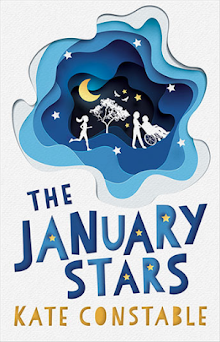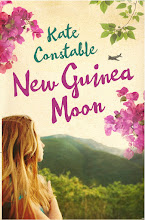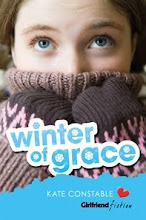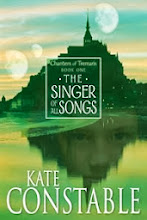1) What is the working title of your next book?
New Guinea Moon.
Doesn't it look gorgeous??
2) Where did the idea come from for the book?
New Guinea Moon is set in Papua New Guinea during the summer of 1974-75, the summer before PNG got Independence from Australia. I spent most of my childhood in Papua New Guinea in the 1970s and I've always wanted to write about that time and place, but I was never quite sure how to approach it. It's partly based on my own memories, partly based on a lot of reading and research, but the actual story is all made up.
 3) What genre does your book fall under?
3) What genre does your book fall under?It's a young adult book - part coming-of-age story, part family drama, part romance, set in a unique moment in history. Something for everyone...
4) What actors would you choose to play your characters in a movie rendition?
Oh, help. When I'm writing, I can never see the faces of my characters very clearly. I guess I can see Julie as looking a bit like Brenna Harding, who was great in the TV adaptation of Puberty Blues this year. (It's not impossible that I'm being influenced by the whole 70s thing though...)
Ryan can be played by Blake Davis (though he is slightly too good-looking to be Ryan, really). He needs to be sulky.
And maybe Aaron McGrath as Simon? He was so good in Redfern Now as the school boy who refused to stand for the national anthem -- a perfect combination of self-containment and pride, but inner vulnerability - he would be a fantastic Simon. He's too young though - but by the time they make the movie, he'll be the right age!
Hey, this was a good exercise, actually, I'm glad I did this!
5) What is the one-sentence synopsis of your book?
When sixteen year old Julie travels to the Highlands of PNG to be reunited with her estranged father, she might expect culture shock, she might hope for first love, but the secrets she uncovers make for a truly unforgettable summer. (Okay, I nicked that off the actual back cover blurb, written by a far better blurb writer than I will ever be.)
6) Will your book be self-published or represented by an agency?
New Guinea Moon will be published by Allen and Unwin in March 2013.
7) How long did it take you to write the first draft of the manuscript?
I spent about three years working on this book, and it changed shape and form many, many times. There are eighteen partial first drafts on my laptop, and three or four versions of the final manuscript.
8) What other books would you compare this story to within your genre?
Hm, not sure... Towards the end, I had in the back of my mind the beautiful, painfully sensitive books of Rumer Godden, books like The Peacock Spring or Kingfishers Catch Fire or The Greengage Summer, where growing up and culture shock go hand in hand. Not that New Guinea Moon resembles those books, really, but that was what I was aiming for!
9) Who or what inspired you to write this book?
I think Australia's involvement with PNG is a really under-explored part of our history. But almost everyone I discussed this book with would say, oh, my uncle lived in New Guinea, or I was born there, or my sister spent some time in PNG. There are so many Australians with a link to the country, yet it doesn't seem to be talked about very often. Maybe there is some element of shame about our colonial past, it's as if we don't know how to talk about that history. I'm really fascinated by that silence; it's like a secret history that you only know about if you were actually there. But I'm glad that just recently a few (adult) books about that period of PNG history have been published -- like Drusilla Modjeska's The Mountain and Jon Doust's To The Highlands. So perhaps the time is ripe.
10) What else about the book might pique the reader's interest?
What, that's not enough?? It also has aeroplanes, and earthquakes, and heartbreak, and hope.
I'm not tagging anyone else because I don't know who else to tag. Sorry.



















